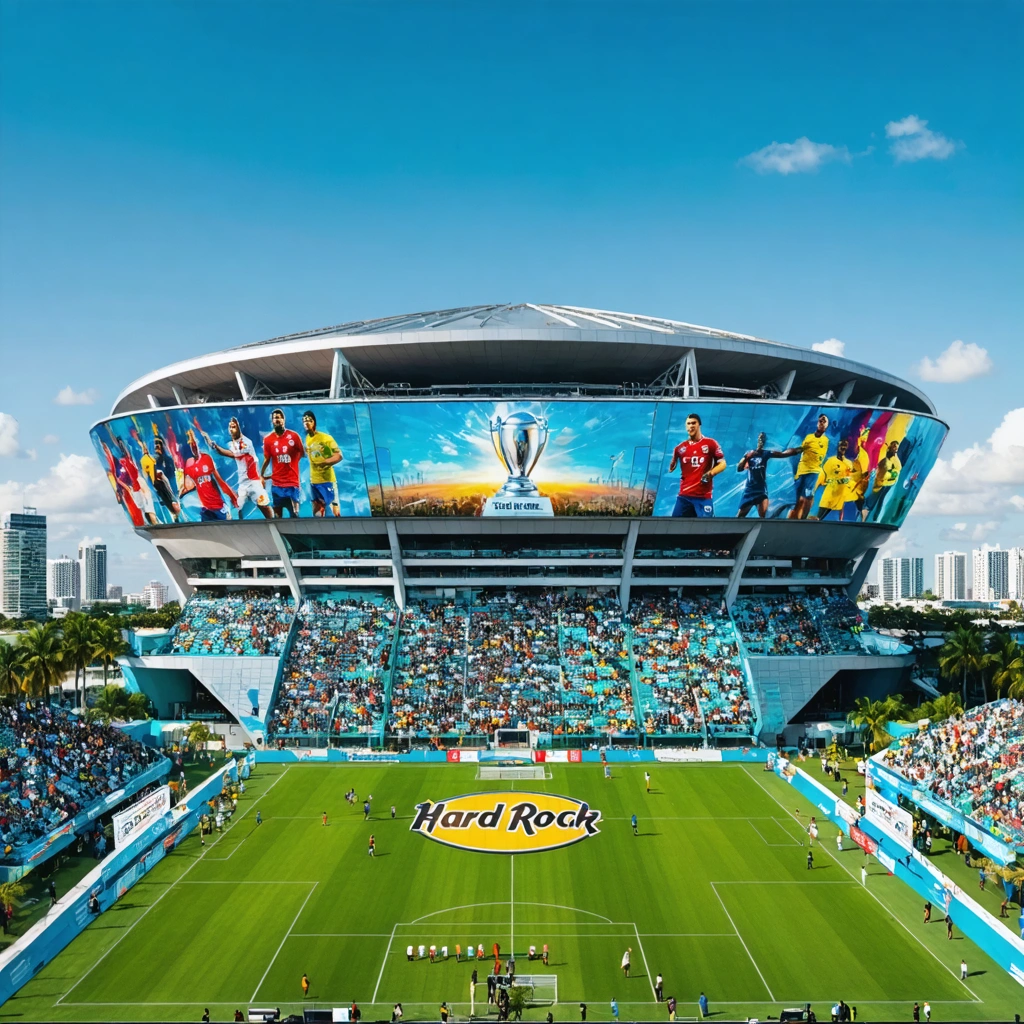Hard Rock Stadium Enhances Security: Stadium Bolsters Club World Cup Safety

Anticipating the FIFA Club World Cup 2025: A Spectacle with Serious Security Demands
As Miami gears up to host one of soccer’s most prestigious tournaments—the FIFA Club World Cup in 2025—the spotlight isn’t just on the players and the thrill of the game. The atmosphere is electric, the crowd buzzing with excitement, but behind the scenes, there’s a relentless focus on one crucial element: security. Hard Rock Stadium, the iconic venue set to welcome fans from around the globe, has recognized that the stakes for safety have never been higher.
Hosting a major international event like the FIFA Club World Cup means thousands of passionate fans will flock to Miami, eager to witness world-class soccer unfold. But with such an influx comes a complex web of security challenges. From crowd management to preventing potential threats, ensuring everyone’s safety while maintaining a vibrant, enjoyable atmosphere is no small feat.
So, what exactly is Hard Rock Stadium doing to rise to this challenge? How is the stadium transforming its security infrastructure to keep pace with the unique demands of an event of this magnitude? This article dives deep into the strategic enhancements and technologies being deployed to safeguard the 2025 FIFA Club World Cup experience.
When Passion Meets Precaution: Managing the Crowd and Complexity of a Global Soccer Event
Imagine the scene: tens of thousands of soccer fans, draped in colorful jerseys, chanting and cheering, packed into Miami’s Hard Rock Stadium. It’s a thrilling spectacle, but one that requires an extraordinary level of preparation. The sheer size of the crowd, combined with the international nature of the event, means that security teams face a multifaceted challenge.
Crowd control is only the tip of the iceberg. The stadium must address a variety of potential scenarios, including:
- Screening for prohibited items without causing long delays
- Monitoring for suspicious behavior amidst thousands
- Coordinating rapid response teams in case of emergencies
- Ensuring safe entry and exit routes to prevent bottlenecks
- Integrating security protocols with local law enforcement and emergency services
Miami’s vibrant cultural tapestry adds another layer of complexity. Fans from diverse backgrounds, each with their own customs and expectations, converge in one place. The security approach must be thorough but also respectful and unobtrusive, preserving the joy and unity that soccer brings.
Moreover, the stadium’s location in Miami, a city known for its bustling tourism and international flair, means that the security team can’t simply rely on old methods. They must innovate to stay ahead of evolving threats while managing the practical realities of a large-scale event.
Hard Rock Stadium’s Proactive Leap: Redefining Security for the 2025 FIFA Club World Cup
Recognizing these challenges, Hard Rock Stadium has embarked on a comprehensive overhaul of its security measures in preparation for the FIFA Club World Cup. This isn’t just about adding more cameras or hiring extra personnel—it’s a holistic strategy designed to weave security seamlessly into the fan experience.
Key initiatives include:
- Advanced Surveillance Systems: State-of-the-art cameras with AI-powered analytics to detect unusual activity in real time.
- Enhanced Screening Technology: Contactless scanners and biometric verification to speed up entry without compromising thoroughness.
- Integrated Communication Networks: Ensuring that security teams, local police, and medical responders can coordinate instantly and effectively.
- Crowd Flow Optimization: Redesigning entry points and walkways to prevent congestion and facilitate swift evacuation if necessary.
- Community Engagement: Educating fans on safety protocols and encouraging vigilance without dampening the festive spirit.
By leveraging these innovations, Hard Rock Stadium aims to set a new benchmark for security at international soccer events. The goal is clear: create a fortress of safety where fans can lose themselves in the drama of the game, confident that their well-being is the top priority.
As the countdown to the FIFA Club World Cup 2025 continues, Miami—and especially Hard Rock Stadium—stands at the crossroads of passion and precaution. The fusion of cutting-edge security and world-class soccer promises an unforgettable event where excitement and safety go hand in hand.
Stay tuned as we explore the full scope of these enhancements and what they mean for fans, players, and the city of Miami itself.

Hard Rock Stadium Enhances Security Ahead of FIFA Club World Cup 2025
What security measures has Hard Rock Stadium implemented for the FIFA Club World Cup 2025?
Hard Rock Stadium in Miami has significantly bolstered its security protocols in preparation for the FIFA Club World Cup 2025, recognizing the unique challenges posed by hosting a high-profile international soccer event. These measures include advanced surveillance systems, enhanced crowd control strategies, and closer coordination with local law enforcement agencies to ensure the safety of all attendees.
Specifically, the stadium has upgraded its CCTV infrastructure with high-definition cameras and facial recognition technology to monitor crowd movements in real time. Additionally, the venue has increased the number of trained security personnel, focusing on rapid response teams capable of addressing any incidents quickly and discreetly. Access control points have been optimized using biometric scanners and RFID ticketing to prevent unauthorized entries.
These enhancements are designed not only to prevent potential threats but also to improve the overall fan experience by reducing wait times and ensuring smooth entry and exit flows.
Why is security enhancement critical for the FIFA Club World Cup at Hard Rock Stadium?
The FIFA Club World Cup is a globally watched soccer tournament that brings together some of the most prestigious club teams from different continents, attracting large crowds and international attention. Hosting the event at Hard Rock Stadium in Miami means managing an influx of tens of thousands of fans, media personnel, and VIP guests, which elevates the importance of robust security measures.
Security enhancement is critical because:
- Large crowds: Managing crowd safety in a stadium that seats over 65,000 people requires meticulous planning to avoid overcrowding and ensure safe evacuation routes.
- High-profile attendees: The presence of international players, officials, and dignitaries demands stringent protection protocols.
- Potential threats: The event could be a target for various security risks, including terrorism, vandalism, and unauthorized access.
- Public confidence: Effective security increases fans' confidence in attending live sports events, which is crucial for the success of the tournament and the sport’s reputation.
By proactively addressing these factors, Hard Rock Stadium ensures that the FIFA Club World Cup 2025 in Miami is both safe and enjoyable for everyone involved.
How does the stadium’s location in Miami influence its security preparations for the FIFA Club World Cup?
Miami is a vibrant, multicultural city with a strong passion for soccer, making it an ideal host for the FIFA Club World Cup. However, its urban environment also presents unique security challenges that the stadium must address.
Miami’s status as an international travel hub means that Hard Rock Stadium must coordinate with federal agencies such as the TSA and Homeland Security to monitor air travel and border security. The city’s diverse population and traffic density require effective transportation management plans to control crowd movement to and from the stadium.
Additionally, Miami’s climate, with potential for severe weather, necessitates robust contingency plans that integrate security with emergency response services. These factors are all considered in the stadium’s comprehensive security strategy to safeguard the FIFA Club World Cup event.
What are the best practices for managing crowd security in a large soccer stadium like Hard Rock Stadium?
Managing crowd security in a stadium like Hard Rock requires a multifaceted approach that balances safety with fan experience. Best practices include:
- Pre-event risk assessment: Identifying potential security threats specific to the event and location.
- Multi-layered security screening: Combining physical searches, electronic scanning, and credential verification at entry points.
- Clear signage and communication: Ensuring fans are well-informed about stadium policies and emergency procedures.
- Real-time monitoring: Using surveillance systems and crowd analytics to detect and respond to unusual behavior promptly.
- Staff training: Providing security personnel with specialized training in crowd psychology, conflict de-escalation, and emergency protocols.
- Collaboration with local authorities: Coordinating efforts with police, fire, and medical services for comprehensive event coverage.
- Post-event evaluation: Reviewing security incidents and feedback to improve future operations.
These practices help Hard Rock Stadium not only protect attendees but also maintain a positive environment for enjoying the FIFA Club World Cup and other soccer events.
How does Hard Rock Stadium’s security upgrade impact the overall fan experience during the FIFA Club World Cup?
While heightened security might sometimes be perceived as a barrier to fan enjoyment, at Hard Rock Stadium, these enhancements aim to create a seamless and safe environment that enhances the overall experience. Efficient crowd management reduces congestion and waiting times, allowing fans to focus on the excitement of live soccer matches.
Moreover, visible security measures can provide reassurance, encouraging more families and international visitors to attend. The use of technology, such as digital ticketing and contactless entry, streamlines interactions and minimizes touchpoints, which is especially important in a post-pandemic context.
By integrating security with customer service, Hard Rock Stadium ensures that safety protocols contribute positively to the FIFA Club World Cup 2025 experience, making Miami a proud host city for this prestigious soccer event.




